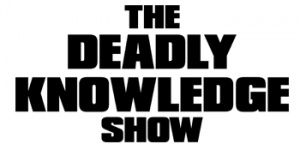The Deadly Knowledge Show
Synopsis
A quiz "where pop culture meets posh culture", according to the publicity.
Two pairs play, firstly a round of five multiple-choice questions on the buzzer, then an individual round placing people or things into one of two categories against the clock (somewhat reminiscent of the endgame of Every Second Counts), ad break, then the multiple-choice round played again with the slight twist that players buzz in for their partner to answer, and another individual round played for double points. At each stage of the game, a wrong answer results in points being subtracted. One of the winning pair goes on to answer questions about six famous people within a minute to win a holiday and some other nice stuff.
For the second series, a few tweaks are in place. The second solo round is now a variation on the original endgame, with the names of eight famous people displayed on screen, while the two soloists compete on the buzzer to identify which one is being described. The winning team now faces the Every Second Counts game (which has acquired the title "Sudden Death Row") as a pair, answering alternate questions. The longer a chain of correct answers they put together, the more money they win, up to a total of £5000 for eight in a row (so now it's Every Second Counts meets the Four In A Row round from Going for Gold). In addition, they can come back the next day to try for more money, though if they lose the next day they leave with nothing. The set is also slightly improved, though the lack of on-screen graphics in the endgame is an unfortunate oversight.
Unfortunately, the show still fails to deliver on its "Deadly Knowledge" promise. Yes, it does indeed feature questions on both "high" and "low" culture. The problem is, so does every other general knowledge quiz on the box. That's why it's called general knowledge (duh!). For all its bluster, the reality is that the questions are just the same level (and all too often, the very same questions) as, say, In It to Win It. A more appropriate title would be The Mundane Knowledge Show.
Dave Berry attempts to disguise the sheer averageness of the quiz by providing lengthy and entirely irrelevant preambles to the multiple choice questions, but frankly they're a bit boring and the show would be much improved by using the time to cram in some more questions. The individual rounds are much better, being fast-paced and reasonably challenging. In fact, they put the rest of the production to shame. As does the fact that Headjam did this concept so much better.
Trivia
Somehow, TDKS is broadcast as a schools programme. Around 2004, Channel 4 revamped its educational output - the result being that primary programmes are now shown at 4am in the morning and 'yoof'-style documentaries and entertainment like this is shown instead. Indeed, Channel 4's morning edu-tainment programmes seem to go round and round on a loop - the two series of this show were still in the regular morning rotation in 2009, along with re-edits of Get Me the Producer and other re-re-re-recycled (at least) non-gameshow programmes like TV is Dead? and The KNTV Show.


